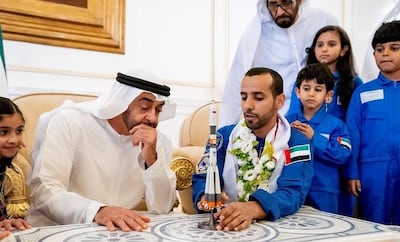Fourteen years ago, the Mohammed bin Rashid Space Centre was founded in Dubai, establishing the country's nascent space programme. Since then, the UAE’s interplanetary ambitions have soared. Three years ago, the nation had no professional astronauts, but in less than a year, an Emirati astronaut has already been to space and the country will imminently send a probe to Mars, in co-operation with Japan.
These missions, accomplished in a remarkably short time, embody the determination and spirit of the Emirates to lead the Arab world's achievements in space. The space programme is also testament to the UAE's will to invest in new technology, contributing to the expanse of humankind's knowledge beyond the realms of Earth, and nurture a new generation of homegrown scientific talent. Since the start of the space programme, universities have introduced new areas of scientific study and the interest in STEM subjects have soared.
Last September, Hazza Al Mansouri became the first Emirati astronaut to go to space. He boarded a Soyuz rocket from Kazakhstan and reached the International Space Station, where he represented his country alongside scientists from around the world. Maj Al Mansouri's mission has made Emiratis proud and inspired an entire generation of young men and women to pursue careers in astrophysics and other scientific fields so that they could follow in his footsteps.
The success of the country’s first space mission has also laid the ground for other ambitious projects. Early on Wednesday morning, at 12.51 am, the UAE will launch the Hope probe, the first Arab mission to Mars.
At a time when the coronavirus pandemic has forced nations to curb budgets that are not veered exclusively to developing a vaccine, the UAE’s commitment to space ventures and continued investment in new technology stands out.
It is the aim of Hope to study the upper and lower atmosphere of Mars, where in the coming century, the UAE aspires to build a colony.
Despite the world being thrown in turmoil because of the pandemic, the UAE has remained undeterred in its space ambitions. The UAE has been at the forefront of efforts to contain the spread of Covid-19. It is the country where the most tests have been carried out per capita. Last month, an Abu Dhabi company invented a rapid coronavirus laser testing technology that could make it possible to conduct mass screenings and deliver results in mere seconds.
That the launching of the Hope probe was not delayed or cancelled due to the pandemic is a major achievement in and of itself. But science is not the only driver of the UAE’s space programme.
According to Nidhal Guessoum, an Algerian astrophysicist at the American University of Sharjah, the prime objective of the Hope probe is “to catalyse this generation".
The Mars mission, along with the rest of the UAE’s space programme, is another chapter in the UAE's ambitious story. These accomplishment set a positive example in a a region riddled with conflict and economic mismanagement, and serve to prove that Arab nations have what it takes to thrive.
In the words of Sheikh Mohammed bin Rashid, Vice President and Ruler of Dubai: “Our journey to space represents a message of hope to every Arab citizen that we have the innovation, resilience and efforts to compete with the greatest of nations in the race for knowledge”.


